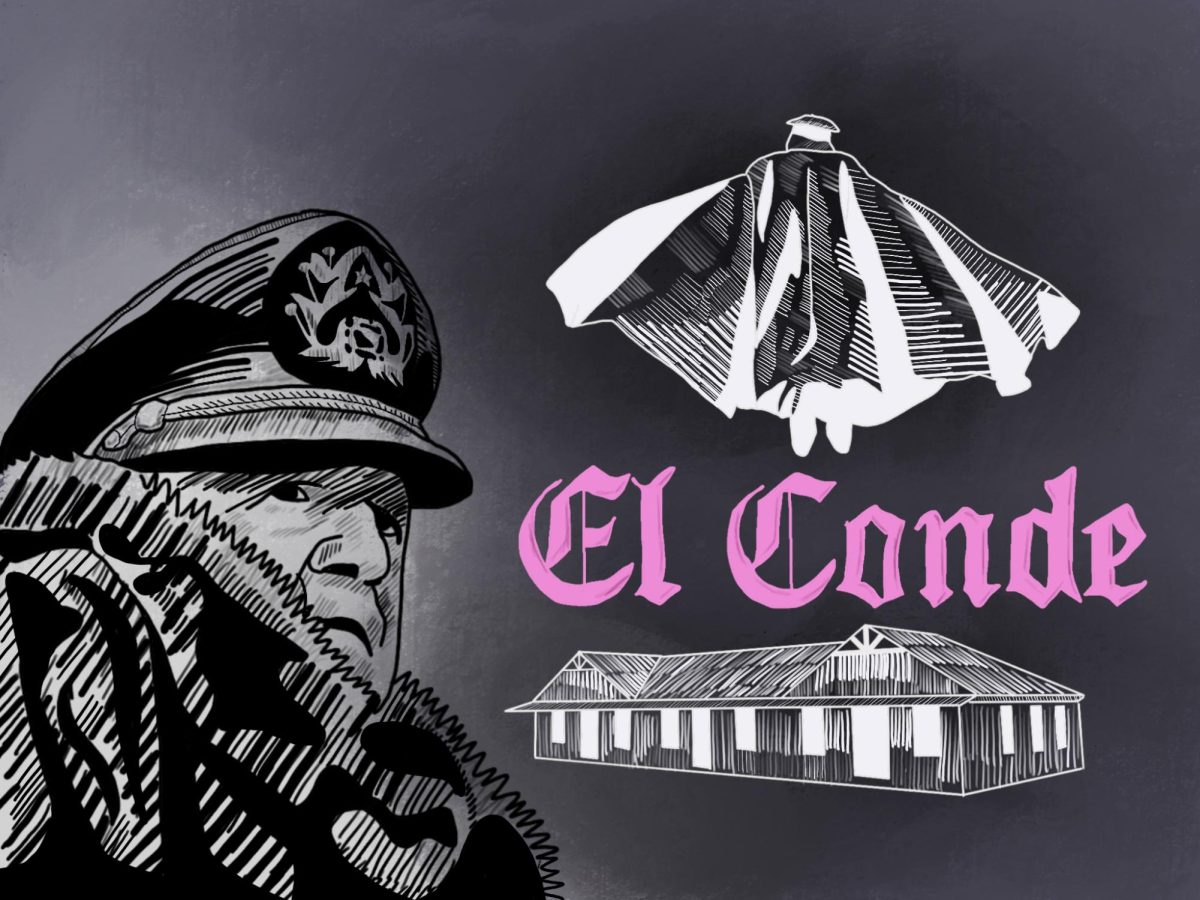A shadowy figure emerges from the screen, leaping across the cloudy skies. His silhouette, styled with a gothic cape and oversized collars, closely resembles that of the infamous Count Dracula — a vampire on the lookout for his next victim. The audience watches the gruesome details of this hunt. Helpless Chileans are stabbed in the chest, their hearts cut out, grinded in a blender and drunk by the dark figure. As the camera reveals his face, the viewers get to see that this is not a mythical creature after all. Rather, it’s Augusto Pinochet, the ruthless Chilean dictator, wearing a military coat and a service cap, laden with medals.
Pinochet was a Chilean dictator who ruled the country for 17 years. Praised for the advances in the economy but reviled for his political corruption and cruelty, Pinochet admired totalitarian rulers, especially Napoleon. Like his inspiration, he wanted to have complete control over Chile’s government and its people. Throughout his regime, lasting from 1973 to 1990, the dictator imprisoned and executed thousands of civilians, illegally transferred over $27 million to foreign bank accounts and ordered the assassinations of his political enemies throughout his regime. Even up until his 2006 death, he never apologized for any of his accused crimes.
Director Pablo Larraín’s “El Conde,” or “The Count,” portrays Pinochet (Jaime Vadell) as a 250-year-old vampire who wants to die. Viewers follow Pinochet across history, starting from 18th century France where he initially finds out that he is a vampire, through decades fighting against rebels around the globe, and ending in Chile where he rises to power.
After faking his death in order to retire from a 17-year-long tyranny, Larraín’s vampiric Pinochet lives secluded — essentially alone in a decaying mansion on a deserted island. Once notorious for his ruthless control over Chile, he now spends his days whining to his equally vile wife about how the country despises him, unable to mope around his decaying mansion without the help of his walker. His greedy children hire an accountant named Carmen (Paula Luchsinger), a nun in disguise, to investigate the amount of money their father has accumulated through corruption. Pinochet finds a reason to keep going after falling in love with the bubbly Carmen, but can only do this at the cost of consuming human hearts.
Fresh off the success of “Spencer” (2021), the director’s celebrated psychological drama about Princess Diana, Larraín does little to hide his new film’s political satire. While his previous biographical works like “Neruda” (2016) or “Jackie” (2016) took a more realistic approach to depicting its subjects, “El Conde” is presented through a darkly comedic lens, scrutinizing the life of the controversial dictator.
From having Pinochet wear his iconic sunglasses, to showing Marie Antoinette’s severed head in a jar, Larraín mocks the regime and legacy of Pinochet through careful metaphors woven into the narrative. The fantastical premise, a 250-year-old vampire dictator, ironically grounds the film in reality as it jumps between genres, poking fun at everyone on its path.
Rather than directly showing the crimes of Pinochet, the film chooses to focus more on highlighting the absurdity of his rule.The only time the viewers explicitly see Pinochet’s corruption is when Carmen investigates his secretly accumulated wealth. No one is tortured on screen. No real footage of Chilean executions are shown. The audience is only left with a cranky, whining old man.
But despite the film’s black humor, the unapologetic attitude of Pinochet is what makes “El Conde” so horrifying. It is not the premise of a gothic horror that unsettles the viewers, rather the feeling of decay and rotting that is prevalent throughout the film.
With phenomenal performances from its stellar cast, “El Conde” paints a disfigured portrait of Pinochet. There is nothing flashy about this film. The editing is timely, utilizing long and subtle takes until the film hits full acceleration as its characters spiral out of control. The grandiose music and sound design ironically highlight the desolation of the secluded island. But because of composed choices, Larraín is able to emphasize the gothic freakishness in Pinochet’s indifference to violence and insanity. He utilizes this absurd depiction of Pinochet to highlight the everlasting scars he left on Chile through his military regime.
This is a narrative that can only be told by a Chilean director to the Chilean audience — a wound that has engraved itself so deep into the country’s history, it can only be best told in the farcical form of a black comedy.
“El Conde” is a film that feels like it is frozen in time. The Pinochet couple lives alone with their butler on a secluded island. The sky is always foggy and cloudy. The wooden floor of the mansion has been horribly damaged, leaving the earth underneath bare. The beautiful, gothic, black-and-white cinematography, the classical music choices throughout the narrative, the slow editing of the film, and the theatrical performance of each character all help to create a feeling of deterioration of morals and life.
It elongates Pinochet’s last moments, portraying a man who does not want to admit to his crimes as a vampire who feasted on Chilean blood. On the screen, the historical pain lives on with the undying vampire. But in reality, it lives on with the audience, whose memories of the tyranny can only be alleviated by looking at the dictator through a comedic lens.
“El Conde” is streaming on Netflix and screening at the Paris Theater until Sept. 22.
Contact Tony Jaeyeong Jong at [email protected].
























































































































































